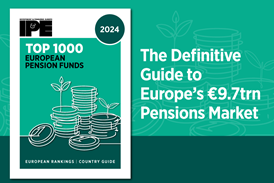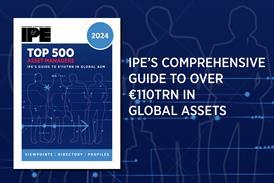Richard Hancock
Comments - Page 3
Presumably, the objective of the regulations is to positively affect trustees' behaviour; but I wonder how many will simply offload the completion of the extended SIP to consultants and carry on pretty much as before?
How many current SIPs are all that scheme specific and how many are boilerplate, supplied by consultants?Is there any quid pro quo? For example, will the additional tax levied on pension assets, specifically, be earmarked to provide additional services that benefit pensioners?
I guess anyone working in retail who has a DB pension is going to be worried about the possibility of falling into the PPF, so it may make sense to bite the bullet and close to future accruals now.
I'd be slightly wary of spinning this (as John Lewis does) as "saving approximately £80m in annual pension costs", since the other side of the coin is that there's a reduction in benefits provided (at the very least in the sense that benefits are no longer quite so well defined, as a result of the shift from DB to DC).Not sure I quite follow the figures here, but it looks like the current contribution rate of 10.4% from members is acceptable to the UCU. With the 22.5% from employers, that makes a current total contribution rate of 32.9%.
The highest proposed total contribution rate of the three options is 33.7%, which is only 0.8% more than the current rate.
Is it that the UCU don't think it would be acceptable for members to pay an additional (pro rata) 0.25%? Or are members being asked to pay more than that? Or is it that benefits would still be cut?
Holding out for "[absolutely] no detriment", seems a bold strategy."an early retirement option for workers in physically demanding jobs"
What are the options, in the Netherlands, for someone who has to give up a physically demanding job before they reach retirement age?
Are they likely to be able to find a different job? Will the Dutch government support their retraining? How does any "unemployment benefit" they might receive compare to their previous salary and to their expected pension at retirement age?
In other words, is having an early retirement option, the only solution to the problem?"Every three years gains from the investment returns are locked-in and the 90% guarantee is extended to these gains. This lock-in is not applied if the asset value has fallen below the last guaranteed sum over the previous three years."
Thanks for explaining the detail.
If I've correctly understood what you wrote, it sounds like they're offering downside protection. If investment returns have been so poor that you would have lost more than 10%, your loss is capped at 10%. Otherwise, you get the investment return (whether positive or negative, e.g. minus 9%). It's unclear if the investment return is net, i.e. is reduced by the cost of the downside protection.
I assume that the general rule ("up until now all German occupational pension plans have had to guarantee at least the contribution level") was that any loss would be capped at 0%, so you couldn't lose money in nominal terms.Thinks: German government can borrow for peanuts (i.e. negative real rates); equities "should" return around 4% real per annum; let German government increase borrowing and buy equities to fund pensions! What could possibly go wrong?
I had a quick look through the English language version of Scope's report (thanks for the link) and it didn't seem to mention any potential significant problems/risks with the approach they suggest. It really does seem to be an "all pros and no cons" sales pitch. At the very least, they might want to run it by the UK's John Ralfe; I'm sure he'd have some interesting views on this.
Maybe I'm being overly harsh on this proposal, but I think it pays to be wary of ideas that seem to be "too good to be true".A bewildering headline -- just how do you "insure [a] DC [section]"? -- quickly clarified in the body of the article: "a £300m defined contribution (DC) plan [was converted] into a defined benefit (DB) arrangement, before then being added to the buy-in deal."
It prompts the question, is it ever possible to insure -- in a meaningful way -- a DC pension scheme? Ignoring life insurance, which may be offered as an adjunct, presumably you'd be looking at an insurer offering to sell deferred annuities to (active) members? I suspect this would be perceived by members as being a prohibitively expensive option. But it would be interesting to know if anyone (i.e. any board of trustees of a DC scheme) has ever looked into the feasibility of this."Diversifying investment risks could increase the chances of pension funds all having to cut benefits at the same time, Dutch economists have argued."
It sounds like an argument that it would be better if fewer pension funds had to make cuts. But, presumably, the cuts would be deeper than if the pain had been spread around? Not a lot of "social solidarity" in such an approach.Knowing nothing of substance of German pensions, I would have like a little more background in this article.
(I appreciate it's hard to find the right balance between background exposition and reporting of news. And, being a UK layperson, I'm probably not the target market for articles on German pensions. For the record, my assumption is that the German "first pillar" ("State Pension", in UK terms) provides a good level of income; but perhaps that's an incorrect/outdated view.)I wonder what effect this move by TPR will have on DB scheme deficits and asset allocation?
Will it encourage sponsors to forgo/limit dividend payments in the short to medium term in order to reduce deficits and de-risk (e.g. via buy-ins), so that TPR isn't breathing down their necks when they want to pay dividends in the longer term?I'm all in favour of people being smart investors (e.g. using the "free lunch" of diversification), but I do think it's sometimes a little too tempting to be too "smart".
It seems like they're saying: "We love the higher expected return of equities, but all that potential volatility is not really our cup of tea!"
If they have a medium term need for cash (to pay pensions), perhaps they really ought to be in cash in the short term?"He highlighted that the pension funds themselves would now be responsible for filling in any future shortfalls."
What does that mean? It seems to imply that the sponsor is walking away from the schemes; but presumably TPR wouldn't allow a solvent sponsor to do that? I can only assume the schemes have fully insured their liabilities and so the insurers will effectively "be responsible for filling in any future shortfalls".Knowing nothing of the Swiss first pillar -- beyond what I read in the article -- it does seem like Compenswiss should be congratulated for not kicking the can down the road.
I don't know if it's possible to define precisely what the liabilities are for a buffer fund, but I'd hope that Compenswiss are also looking at their whole asset allocation from an Asset Liability Management perspective.A very interesting article.
As well as considering the (purely financial/economic) Aaron condition, it strikes me it's important to also consider the political dimension.
If you bank on a pay-as-you-go pension promise, then you need to consider what might change (e.g. dependency ratio) to undermine it over the decades before you receive it.Wasn't obvious what "1e" (in "1e plans for high earners") stands for. Is it the (French) Swiss way of writing the English "1st" (short for "first")?
This perhaps falls under "Lack of confidence in long-term investment", but I wonder if high inflation is encouraging members to opt-out, e.g. if investment returns are negative in real terms?
An interesting article (since I wasn't even aware that Turkey had auto-enrolment).
Reading the article, I was left wondering what the contribution rates were (e.g. were they set too high), but I found the answer in the link to the "Turkey: Rethinking auto-enrolment" article.
One other thought: is high inflation encouraging members to opt-out, e.g. if investment returns are negative in real terms?Some refreshingly unspun comments from Mr van de Kieft. "In recent years several new members have joined the board and they have a shorter history with TKPI." Ouch!
"implying higher liabilities for some schemes"
Having quickly scanned the report, I don't think the assertion above is correct.
The relevant part of the report appears to be: "There is no benefit value uplift for individuals. However, it is expected that initial pensions for many members will be higher than at present when they come into payment, as a result of moving to a common approach for future increases."
My reading of that is that, if there is no benefit value uplift for individuals, scheme liabilities would remain unchanged.











Commented on: 2019-06-10T12:48:00.523
UK signs off further reporting requirements for pension funds